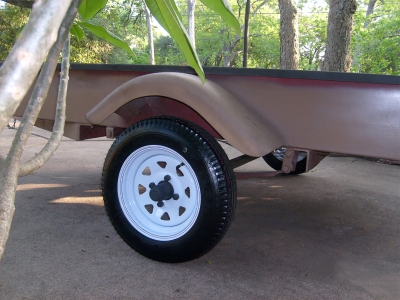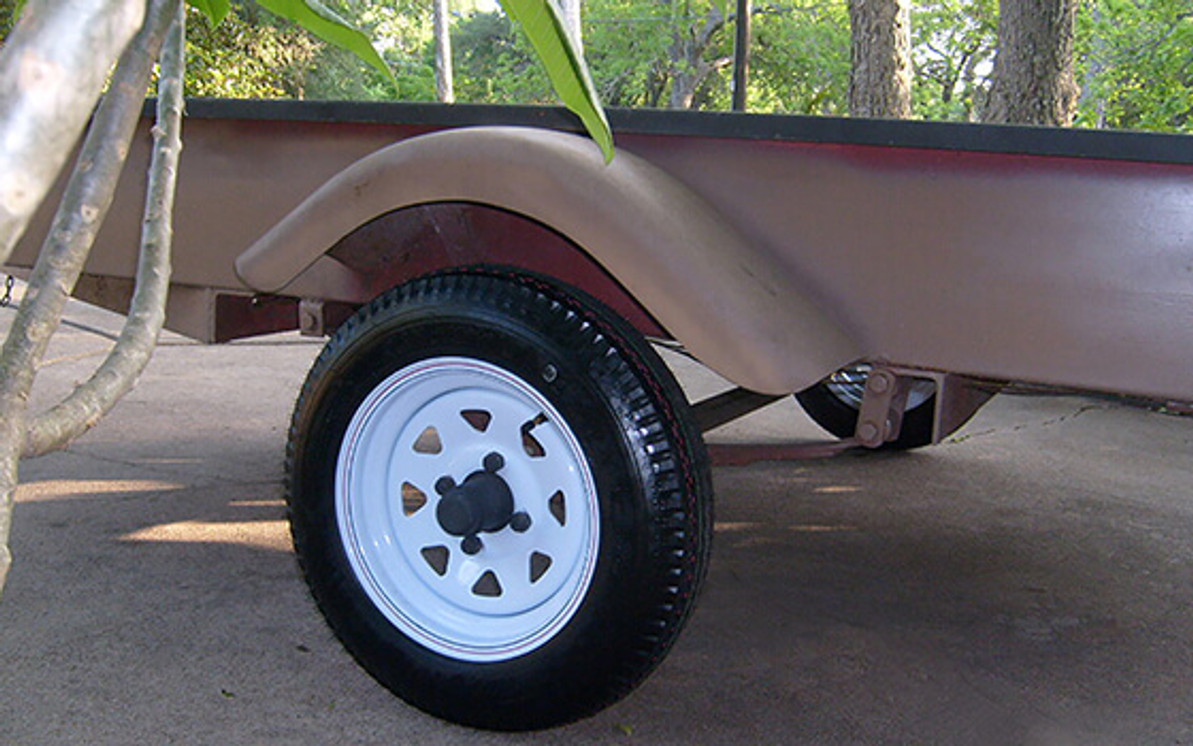Replacing a Trailer Tire?
Changing a trailer tire can seem like a huge chore, but if you understand the basics you will get up and running in no time. Don't be intimidated by the selection of tires in the market. At Recstuff.com we offer all the trailer tires and accessories you may need. At any time you're confused you can contact our customer service team via phone, chat or email.
There are several types of trailer tires, including:
- Bias ply tires: These tires have a simple design and are made of multiple layers of rubber-coated fabric that run diagonally across the tire. They are affordable and widely used for light-duty trailers, but tend to have a shorter lifespan compared to other types of trailer tires.
- Radial tires: These tires have a more advanced design, with the layers of rubber-coated fabric running radially across the tire from the center to the edges. They offer better handling, ride comfort, and fuel efficiency compared to bias ply tires, making them a popular choice for heavy-duty trailers and RVs. What Is The Difference Between A Radial And Bias Ply Trailer Tire?
- ST tires (Special Trailer): These tires are designed specifically for use on trailers and are required by law for some types of trailers, such as boat trailers. They have a reinforced sidewall and are rated for higher loads and speeds compared to standard passenger car tires.
- Load range E tires: These tires have a heavy-duty construction and are designed for use on larger, heavier trailers such as horse trailers, cargo trailers, and travel trailers. They have a higher load capacity compared to standard trailer tires.
- Low profile tires: These tires have a shorter sidewall and a wider tread compared to standard tires, giving them a sportier appearance. They are commonly used on high-end travel trailers and RVs.
It's important to select the right type of tire for your trailer based on the weight it will be carrying, the type of load it will be carrying, and the conditions it will be used in. Always refer to the manufacturer's specifications and recommendations.
Are you also updating other parts of your trailer such as the fender? if you’re in the market for replacement fenders at a reasonable price, or maybe just have a technical question about fenders check out Trailer-Fenders.com.
To buy trailer tires, you can follow these steps:
- Determine the size of tires you need: The size of tires you need will depend on the specifications of your trailer. You can usually find the required tire size information in your trailer's owner's manual or on the tire placard that is located on the trailer itself.
- Choose a tire type: There are various types of trailer tires available, including bias ply, radial, and specialty tires. Radial tires are the most common type of tire used for trailers, as they provide good handling and stability.
- Choose a brand: Some popular brands of trailer tires include Kenda, Michelin, Global Trax and BF Goodrich.
- Decide on the number of tires you need: Trailers typically have one or two axles, and you'll need to purchase tires for each axle.
- Choose a retailer: You can buy trailer tires from a variety of retailers, including tire dealerships, online tire retailers, and big-box stores.
- Place your order: Once you've found the tires you need, you can place your order either online or in-store, depending on the retailer.
- Install the tires: You can either have the tires installed at the retailer or have them shipped to you and install them yourself or have a professional install them.
It's also a good idea to check the tire pressure and inspect the tires regularly to ensure they are in good condition.

Here are the general steps to replace a trailer tire:
- Prepare the area: Make sure the trailer is on a flat and level surface, and use wheel chocks to secure it in place.
- Remove the old tire: Locate the lug nuts on the wheel and remove them using a lug wrench. Carefully remove the flat tire from the trailer and set it aside.
- Mount the new tire: Place the new tire on the wheel and hand-tighten the lug nuts as much as possible.
- Torque the lug nuts: Using a torque wrench, tighten the lug nuts to the manufacturer's specifications, which can usually be found in the owner's manual or on the tire sidewall. It's important to tighten the lug nuts in a star pattern to ensure even pressure.
- Check the tire pressure: Use a tire pressure gauge to check the tire pressure and adjust as necessary.
- Test the trailer: Before hitting the road, test the trailer by gently bouncing it up and down to make sure the tire is properly secured.
Note: Always take necessary safety precautions when working on a trailer tire, such as wearing protective gloves and glasses, and following all manufacturer instructions. If you're unsure of your ability to perform this task, it's best to seek the help of a professional.
Alternative Method
A way you can save time and make the replacement process quicker and easier, especially if you are not experienced in working with trailer tires and wheels is by purchasing packaged tire assemblies. A premade trailer tire assembly is a complete tire and wheel combo that includes a tire, rim, valve stem and ready for installation on a trailer. The purpose of having a premade trailer tire assembly is to provide a convenient and easy-to-install solution for replacing the tires on a trailer, without the need to disassemble and reassemble the components. Overall the easiest and most efficient way to change a trailer tire is by purchasing a package with Recstuff.com and having them balanced at a low cost.
Recent Posts
-
Lawn and Garden Tire Information
Spring is here, which means it's time to bring out the lawn tractor and get the yard ready for warme …Mar 24th 2025 -
Snowmobile Trailer Tips
When the snow starts to fall, you may be itching to hop on your sled and hit the trails. However, be …Jan 6th 2025 -
Keep Your Golf Cart on Course - A Guide to Golf Cart Maintenance
Golf carts are a useful and convenient mode of transportation for leisure and for work …Sep 30th 2024




